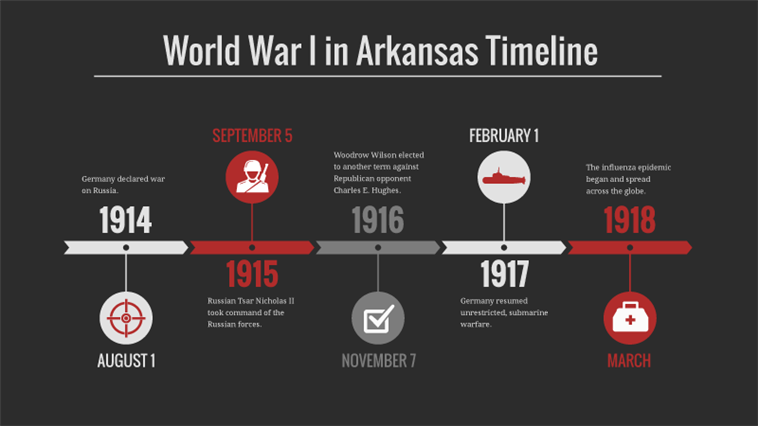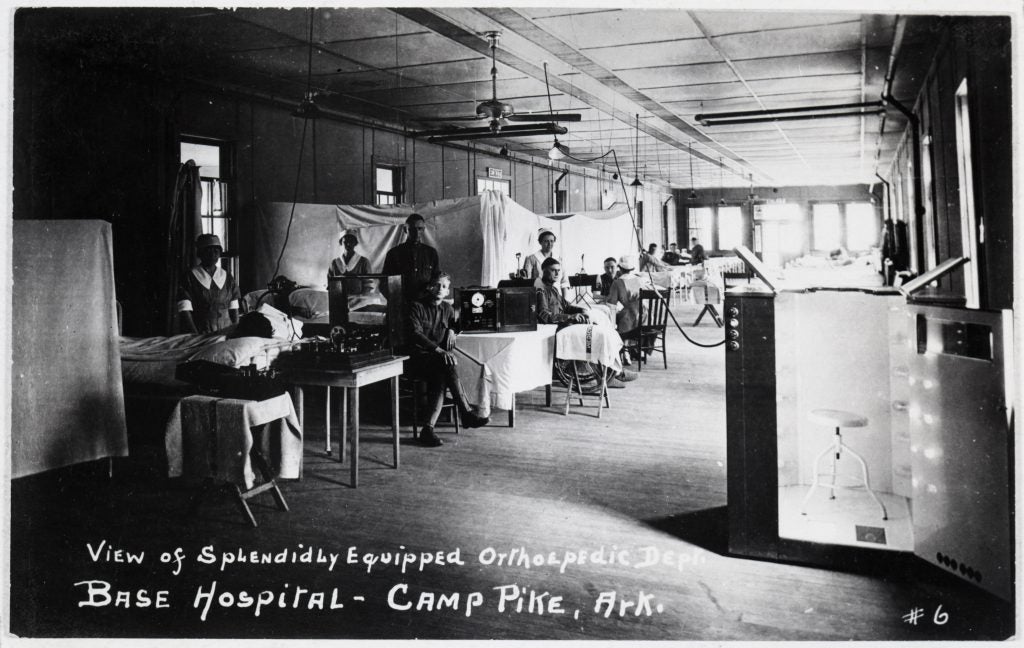Do it well. Do it cheerfully. Do it now: Arkansas in The Great War
The Civil War tends to get (well-deserved) top billing in these parts, but the impact on Arkansas of the First World War should not be underestimated—it literally changed the landscape, resulting in the creation of both Camp Pike (now Camp Robinson), the construction of which employed 10,000 people, and subsequently Eberts Field.
The war drew nearly 72,000 Arkansans into service, killing 2,183 and wounding another 1,751; three of our soldiers earned the Medal of Honor.
Last spring, a special committee was created, by proclamation of Governor Hutchinson, to commemorate the centennial of the war—officially, April 6th, 1917, the day Congress passed the war resolution, four days after President Woodrow Wilson’s address in favor of US intervention. The Arkansas World War One Centennial Commemoration Committee has worked tirelessly over the last year, doing research and planning activities with more than 30 state and national partner organizations. Events will take place across the state and throughout the rest of the year.

On Saturday, April 8, The Old State House Museum will host a daylong kickoff celebration featuring live performances of music from the era, living history re-enactors depicting infantry and cavalry soldiers and Red Cross nurses, games, and hands-on activities such as a WWI-era bandage-rolling machine like Red Cross volunteers would have used. There will also be informational displays and demonstrations about various civic involvement campaigns of the time, including “Knit Your Bit,” which encouraged people of all ages to knit items needed by soldiers from pattern books distributed by the Red Cross, and the “Better Baby Campaign,” which provided information on how to raise healthy babies during a time of rationing and food shortages. The event is free and open to the public, inside and outside the Old State House, between the hours of 10 a.m. and 4 p.m.
The 76th annual Arkansas Historical Association conference will be held April 20 to 22, with the theme of “Great War, Great Changes” and sessions focusing on World War I and the changes it brought to Arkansas, as well as other great changes throughout Arkansas’s history.
The conference takes place in Pocahontas and headquartered on the downtown square, with registration desk and vendor booths stations in the Historic Randolph County Courthouse, which is also where scheduled meals and the Friday night awards banquet will be held. Concurrent sessions will be in two nearby venues. Registration is $10, and the deadline to register is April 5.

“The Great War: Arkansas in World War I,” a traveling exhibit produced by the Arkansas State Archives, will be touring the state throughout the year. The exhibit tells the story of Arkansas and Arkansans during WWI on a dozen large interpretive panels featuring images of documents, maps, photographs, posters and historical objects from the archives’ holdings. The panels cover the chronology of the war as well as various facets of the conflict: training troops in Arkansas, actions overseas, the Home Front, providing for the war, healthcare and Arkansas heroes. The tour schedule is as follows:
“On the Fields and in the Trenches: Relics of the First World War,” currently on display at the Arkansas State Archives, tells another story of Arkansas in the Great War, this one primarily through artifacts, many of which were collected from the battlefields by an Arkansan named L.C. Gulley who was serving in the Postal Service under the American Expeditionary Forces in Europe.
The exhibit features a vast array of objects, including weaponry, medical equipment, a uniform, helmets, medals and more, complemented with interpretive panels. The words at the top of this page were taken from an object reproduced in the display: a handbook on gas warfare that once belonged to a Dr. M. D. Ogden, a Little Rock physician who had made notations in the book, which had the imperatives to “Do It Well. Do It Cheerfully. Do It Now” imprinted across the top of each page. It’s an optimistic motto from an era not yet jaded by world war.